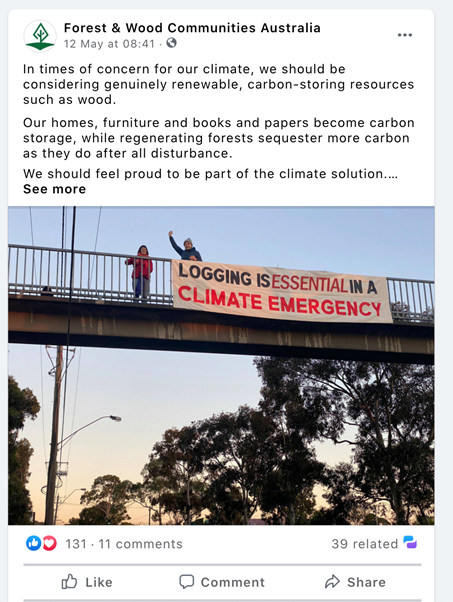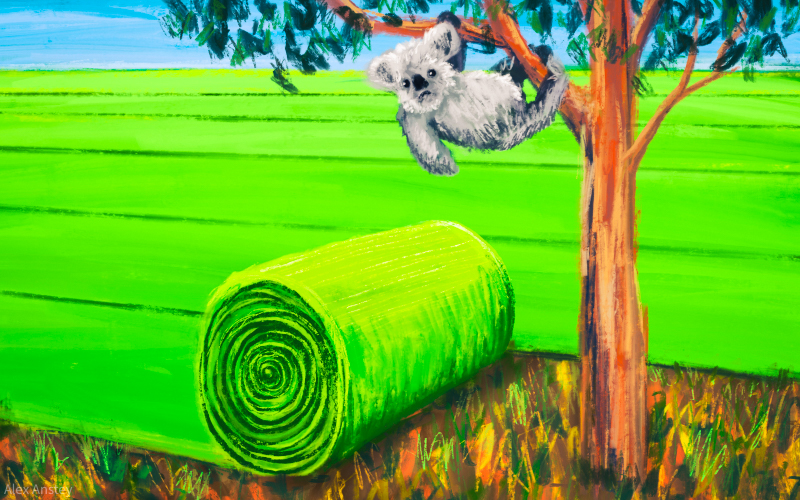Forest & Wood Communities Australia purports to be a grassroots organisation of timber workers but it is founded by the chairman of private forestry company Pentarch and other influential timber industry players. Tasha May reports on a classic case of astroturfing.
Forest & Wood Communities Australia (FWCA) claims to be an “alliance of concerned timber workers and supporters of the timber industry” who believe their industry is “under attack from corporate activism, which funds malicious campaigns and anti-forestry ‘science’”.
FWCA’s ‘About us’ page on its website states:
“We are a grassroots organisation and actively avoid conflicts of interest with corporate influence to ensure we speak for the workers.”
However, the alliance’s ASIC extract reveals the organisation was not the initiative of grassroots timbers workers, but some of the most powerful players in the corporate timber industry.
The Director of Allied Natural Wood Exports, Malcolm McComb, is one of FWCA’s four foundational directors. McComb is the chairman of Pentarch, the private company that controls ANWE. Pentarch is a major agriculture and forestry exporter to Asia, and has an offshoot, Pentarch Industrial, that deals in arms.
Justin Law, the managing director and author of all FWCA’s material, was formerly communications contractor for South East Fibre Exports, which was sold to ANWE in 2015.
Another director, Peter Rutherford, is a spokesman for South East Fibre Exports, secretary of the South East Timber Association, and a former Forestry Victoria general manager.
Steven Dobbyns, the fourth foundational director, owns forestry consultant business Jamax Forest Solutions and is also the director and vice president of Timber NSW, the peak body representing the timber industry in NSW. Timber NSW’s website says it works “shoulder to shoulder” with the state-owned Forestry Corporation of NSW.
The content published by FWCA never quotes timber workers, only Law, who has a professional background in journalism, public relations and communications.
For example, the article titled ‘Relief for forestry families after successful federal court appeal’ does not quote a single forestry family, only Law.
It’s what you’d call astroturfing. A group gives the pretence of being a grassroots movement but is in fact controlled by a concealed organisation, often a corporation promoting its own vested interests.
Australia has seen such tactics before. Tobacco giant Philip Morris used its smokers’ rights lobby group ‘I Deserve To Be Heard’ to urge Australian smokers to make submissions to a parliamentary inquiry into e-cigarettes. The company had also created an AstroTurf group to fight smoking plain packaging laws. Coca Cola funded the ‘energy balance’ campaign, which promoted the idea that people can eat as much junk food as they like so long as it’s balanced with exercise.
In his essay on native logging in The Monthly, Paddy Manning acknowledged that Forest and Wood Communities followed this pattern: “The group looks like an astroturf-marketing operation … Pentarch is funding a culture war on forestry.”
The language of grassroots and astroturfing reminds us that forests are one of the most loaded literary archetypes in Western culture, often associated with concealment and change. In Genesis, Adam and Eve hide among the trees of the garden after eating from the tree of knowledge; in Dante’s Inferno the woods are associated with turning aside from the straight path. FWCA’s astroturfing appears to follow the tradition of co-opting forests for deceptive purposes.
Matthew Wickert, who manages social media accounts for Extinction Rebellion, said he only became aware of Forest & Wood Communities Australia when it misleadingly Photoshopped a banner unleashed by climate activists on a bridge above Bell Street, in Melbourne. The banner’s original wording was: “Logging is criminal in a climate emergency.”
FWCA replaced the word “criminal” with “essential” and then shared the new image on Twitter and Facebook without mentioning it had changed the image.

https://twitter.com/WoodCommunities/status/1392248249101160451
Wickert also noted that despite claiming to be a grassroots organisation, FWCA had just 29 Twitter followers, most of whom comprised “very high end” followers. As of May 26 2021, these included the CEO of VicForests (@CeoForests) and VicForests itself (@VicForestsComms). FWCA’s Twitter account has also shared VicForests’ promotional content.
Other Twitter followers include the Construction, Forestry, Maritime, Mining and Energy Union (CFMMEU) Manufacturing Division, the secretary of the CFMMEU Michael O’Connor, Daily Timber News, Jamax Forest Solutions, and ForestWorks, an industry-owned not-for-profit organisation
FWCA also critiques any scientific evidence against logging. Sharing a post from South East Timber Association, FWCA commented:
“The ongoing attacks by academia on sustainable forestry must be questioned. We would hope that spurious, agenda-driven science has no place in a conversation about forestry which supports thousands of regional Australian families.”
FWCA’s Justin Law told Michael West Media that “one-sided anti-forestry media articles influence the ignorant and consequently the government which results in short-sighted lock-it-up-and-let-it-burn policy”.
Professor of conservation biogeography at the University of Queensland James Watson says in response:
“It’s like a childhood taunt in a schoolyard, not a factual argument.”
Professor Watson says that logging and removing big trees from the forest opens up the canopy, which dries up the system and creates gaps that allow wind to get through.
Ultimately, “logged forests are drier and have more debris on the ground, so fire risk increases massively.”
The forestry industry’s strong lobbying, including by organisations such as FWCA, creates an environment in which “it’s quite intimidating as a scientist to talk about research findings or known ecological facts”, said Sarah Bekessy, Professor of Sustainability and Urban Planning at RMIT specialising in decision science for environmental problems.
Professor Bekessy said the industry “attacks people who challenge them”.
FWCA’s Justin Law stated that forestry had “minimal environmental impact”. Furthermore, timber contributes “positively to our environment by reducing our reliance on plastic, steel and concrete”.
However, Professor Bekessy said the “ecological evidence indicates quite the opposite”.
“Anyone who’s studied long term impacts of forestry concludes that it’s currently not being undertaken in a way that’s compatible with threatened species conservation.”
Professor Bekessy pointed to the greater glider, whose numbers have declined 80% in areas managed for timber.
While she agreed that timber was a sustainable product worthy of investing in, the solution was planting biodiverse species on degraded private land, which would increase forest cover while being regenerative for forest quality.
“Squandering our publicly owned forest resource … is not a sustainable approach.”
FWCA is not alone in spreading a pro-forestry discourse that often repudiates scientific evidence. A cluster of online groups that form a pro-forestry community include No Greens, We support the timber industry, and Timberbiz, which often share and bolster each other’s content.
Timberbiz published an article that copied word for word a media release by FWCA, in which Law stated “our battlefront is in the public arena and we will be a proactive and loud voice in the media and in Parliament”.
Liberal MP Gary Blackwood, the member for Narracan, in Gippsland and a former logging industry worker, similarly promotes in TimberBiz pro-forestry views that repudiate the science.
Natasha graduated with an undergraduate degree in English literature from the University of Cambridge in June 2019 and studied Master of Journalism at the University of Technology Sydney. She is now with The Guardian.

